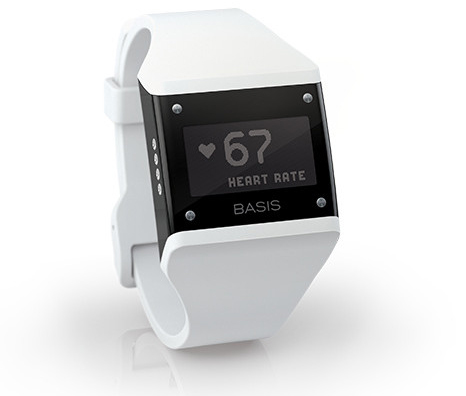Intel, the chipmaker that got caught napping the afternoon the mobile revolution happened, is going to great lengths to make sure it doesn't miss the boat when wearables reach critical mass, as everyone seems certain they will.
“We are catching up. I should just start out with admitting that,” Brian Krzanich, Intel's CEO, said in an interview with CNBC. According to the CNBC report, the company's first-quarter results show that mobile and communications revenue fell a jaw-dropping 52 percent year over year.

The Basis Band, product of Intel's recent acquisition, Basis Science (Courtesy Basis Science)
Betting that the wearables space, the so-called “Internet of Things,” will be the next gotta-have-it boom, Intel scooped up San Francisco smartwatch startup Basis Science, creator of the Basis Band. The Basis Band tracks the wearer's health and features an online personal dashboard that measures sleep cycles and activity.
The state-of-the-art gadget is said to track and analyze REM, light, and toss-and-turn sleep patterns using four different sensors: a three-axis accelerometer to measure body activity and sleep quality, a perspiration monitor, a skin temperature sensor, and a heart rate monitor for pattern accuracy. But we wonder... does it tell time?
And that's not all!
Just to make sure it isn't caught asleep at the switch again, the godfather of the PC revolution is also sponsoring its Make It Wearable worldwide competition. This contest, which hopes to catch The Next Big Thing, is divided into a Visionary Track and a Development Track. The Visionary Track seeks ideas, while the Development Track is looking for product concepts.
The third round of the Visionary Track competition took place in the Asia Pacific region. The search is looking for “ideas that augment technology usage through aesthetics, battery life, security, or privacy and that add to Intel’s vision of innovative tech that is personal, connects and enriches people’s lives,” according to The Hindu (Chennai, Madras, India).
In the Round 3 contest, inventors from India, Japan, Singapore, South Korea and Taiwan showcased futuristic concepts. Semifinal winners will receive a $5000 prize and a travel package for two to the Finals event in San Francisco.
“We believe wearables are the next frontier in evolution of computing to become more personal and connected,” Ashutosh Chadha, Intel South Asia director (Corporate Affairs Group), told The Hindu. “The challenge complements the technology Intel is rolling out to make wearables possible and meaningful for people’s everyday lives,” Chadha continued. “We are extremely pleased to see the response we have got from India and feel that this is testimony to the growing wave of innovation emanating from the country,” he said.
According to Intel's Make It Wearable website, the Development Track will open on May 13.
Round 4 of the Visionary Track will close on May 25, and winners of Round 3 will be announced on May 26.
Submissions for the Development Track will be judged on a balance of creativity, feasibility, and market potential. Intel says that as contestants advance to semifinal and final rounds, they will receive mentoring. Selected participants will receive increasing guidance and mentorship throughout program, business, design, and technical development support, and intensive incubation and education. Finally, the Grand Prize winner will receive $500,000.
Stephen Levy is a contributor to Qmed and MPMN.





